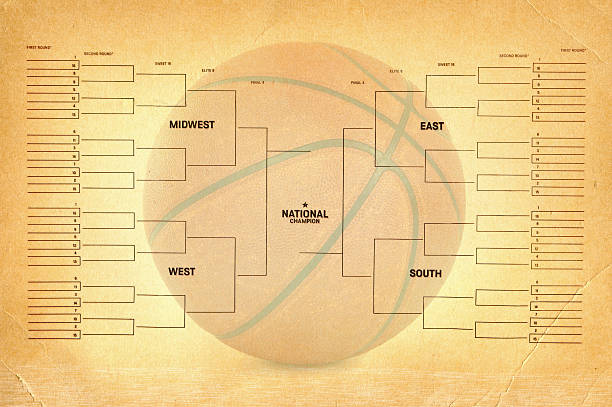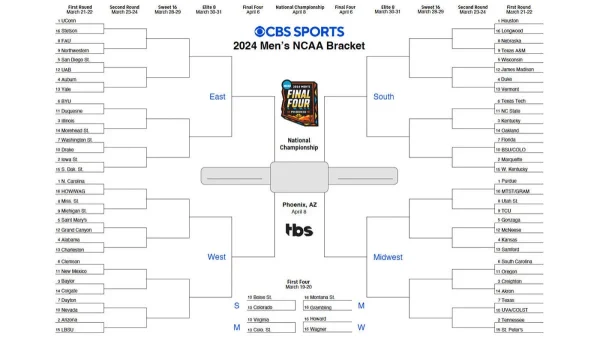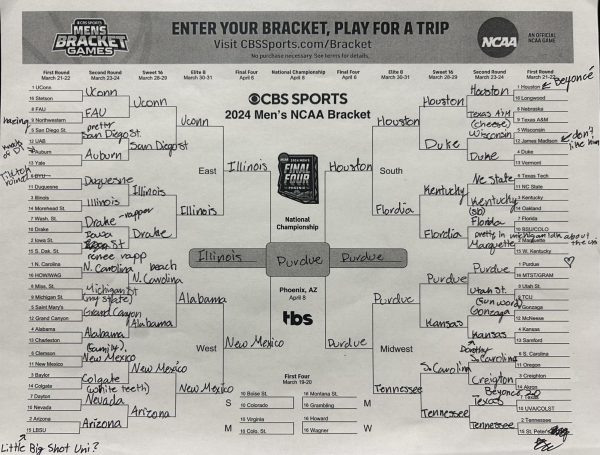On the Contrary: How should postseason tournaments be structured?
64 Team Basketball Bracket.
For fans of all different sports, the post-season is the best time of year. Tournament play begins, and it is win or go home. For tournaments, the quantity of the teams does not always affect the quality, or does it?
Eli Lipke: Although smaller, the NCAA college hockey tournament starts at a size of only sixteen teams throughout the nation. Teams qualify for the frozen four by either winning their conference tournament or being one of ten at-large teams. .The smaller size brings more competition to the playoff spirit. With the field of entries being smaller, it allows for only the best-of-the-best to compete which guarantees the best games. At the same time, it only has a max of four games in the entire tournament, so it is short and sweet and gets to the point.
With a smaller playoff bracket, starting at the equivalent of the NCAA basketball tournament’s Sweet 16, it weeds out all of the refuse and gets right to the good stuff. For instance, this year’s March Madness, Princeton, a #15 seed, was in the Sweet 16. Yes, it is a remarkable run, but people would rather see Arizona. This is why NCAA hockey has the better bracket because you are seeing your better teams such as Michigan, Minnesota, Denver, ST Cloud, Western Michigan, etc. No matter what, you will see the best teams advance throughout the rounds because there is no chance those bad teams will overtake a good team. You will only see the good teams which is what fans want.
Also, the smaller field allows the teams that deserve it to have a better chance. It does not allow teams who had a bad regular season to get lucky and make a run. Instead, it allows the best-of-the-best to compete for the trophy they have worked for all year long. I feel if a team has passion and drive the entire year and keep winning throughout the conference championship, that team deserves to win the title, not some lucky team that snuck in and then somehow figures out how to win in the playoffs.
The NCAA hockey tournament format also brings more excitement because teams know they do not have a sleeper game against a #15 seed or #16 seed. Instead, a team is up against a #4 seed and then a #2 seed and then a #1 seed if it all plays out correctly. This structure is extremely more competitive and makes each team lock-in to compete even harder.
Lastly, this format also makes the regular season more meaningful because instead of sixty-four teams making the tournament, you could be a mid-tier team going into the season compared to the rest but still make it by doing really well throughout the season. It makes every regular season game so important because one loss can make or break your playoff chances. However, in March Madness, you get teams with sixteen losses making it to the tournament, but in hockey, you never see that. This is just one more example of how the quality of competition is better in hockey. Although the Frozen Four tournament may not be more popular than March Madness, it has higher competition, and it stays that way throughout the tournament because no game is ever lopsided.
Jonas VanderWoude: When it comes to postseason tournaments, larger tournaments are much better than smaller tournaments. What I mean is that tournaments with more teams are better both for the sport as a whole and for the fanbase of the sport. For example, whenever someone thinks of a college post-season tournament, that person immediately thinks of March Madness. Said person does not think of the College Football Playoff, or the Frozen Four. The reason for this is simple: the size of the tournament.
With play-in games and then a traditional team bracket, March Madness consists of 68 teams. Unlike most tournaments, it starts with tons of teams, giving it the added hype that it deserves. Basketball fans look forward to the non-stop ability to always have basketball available to watch on a variety of television stations, the drama of Cinderella teams, and the hope of creating the perfect bracket. Nothing compares to March Madness.
Transitioning more to the format of the tournament, the large pool of teams makes it better for a variety of different reasons. First, it allows more teams the chance to compete in the postseason. I think every coach would agree that it does not matter how you start a season, but how you finish it. If a very good team struggles at the beginning of the season due to some injuries or lackluster performance but then begins to pick up steam by the end of the season, that team deserves to have a chance to compete for something. Take the 2023 Michigan State basketball team, for example. That team started off the season very strong but then had an incredibly rough patch, losing several games. If the post-season tournament was small, MSU would not have had a chance to compete for a trophy, but because of the sheer size of the March Madness bracket, the Spartans were allowed to compete. MSU was a mid-tier team in the Big Ten, yet the program made it all the way to the Sweet 16. The size of the field allowed the team to go on a run.
Tournaments are meant to have upsets. In small tournaments, upsets are not that big of a deal. In large tournaments, upsets are incredibly unlikely, which makes it exciting when a team pull off the unthinkable. This year, #16 seed Fairleigh Dickinson upset #1 ranked Purdue. This feat was only the second time in history that this has happened. Having a large tournament makes Cinderella teams like FDU feel incredibly special.
Larger tournaments are the best for the fans. Not only do large tournaments, like March Madness, get more views than most tournaments, but they allow for a bigger chance for fans to be watching their favorite teams in the postseason. Everyone wants to see his or her team have a chance to compete for a championship, and large tournaments make this possible.
Some could say that smaller tournaments are better because only deserving teams who have proven to be the best all year will make it, but this is not true. If a team is really the best, then it will be able to play in a large tournament and still make it to the end. If the team really is the best, it will win regardless. Big tournaments hold the “best” teams accountable. As a higher seed, if you cannot beat a lower seed, you do not deserve to win, and that is why large tournaments are great.
Smaller tournaments are boring and pointless and will never be better than tournaments with large fields.

Jonas is in 11th grade and loves sports. His favorite sport to play is basketball, and he is currently a captain on the varsity team here at FHC. His favorite...

Eli is a junior at Forest Hills Central High School, going into his second year on the FHC sports report team. Eli is a huge sports fan and loves to watch...













